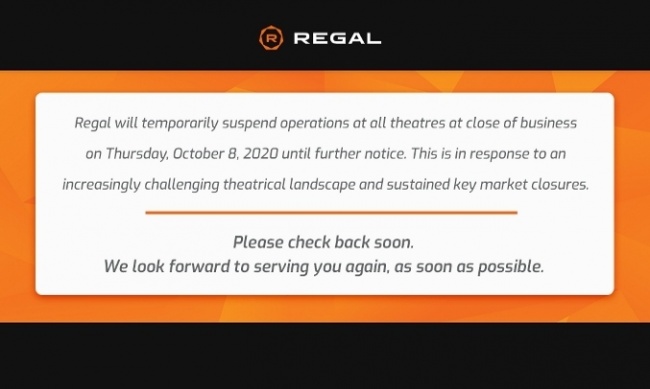Last week, Cineworld, the parent company of Regal Theaters, had finally seen enough. After studios put off releasing the latest installment in the James Bond franchise following postponements and limited releases of most of 2020’s most anticipated movies including Wonder Woman 1984 and Black Widow, the UK-based chain decided to shutter all 536 of its U.S. theaters along with most of its facilities in Great Britain until further notice.
"The prolonged closures [due to the COVID-19 pandemic] have had a detrimental impact on the release slate for the rest of the year, and, in turn, our ability to supply our customers with the lineup of blockbusters they've come to expect from us," said Cineworld CEO Mooky Greidinger. "As such, it is simply impossible to continue operations in our primary markets."
Though Greidinger emphasized the move was temporary, the company has lost gigantic chunks of money and seen its stock place plummet from $275 last year to a low of $22 following the announcement on Monday, October 5. The company also had to furlough 40,000 workers in the US and 5,000 in the UK, per NPR.
No screens, no box office. Theater owners have been hoping for government relief, but with the latest COVID bailout measures stalled, the National Association of Theater Owners estimated that 70% of all small and midsized cinemas could face bankruptcy if studios continue to withhold their biggest features while waiting for the climate to improve. Just today, B&B Theaters, the sixth largest chain in the U.S., said it is just months away from bankruptcy.
Obviously, the pandemic has had a crushing impact on all kinds of businesses, especially ones that rely on large public gatherings. If you’re running a retail shop or convention, perhaps the fate of movie theaters isn’t your top worry at the moment.
Problem is, a huge amount of the comics business now depends on the comic-to-screen pipeline. Publishers and creators depend heavily on the promise of extra revenue from film options, especially now that a lot more of those options are being greenlit. The prospect of big box office revenues has driven industry consolidation and partnerships, ranging from the multi-billion-dollar Disney-Marvel and AT&T-Warner-DC deals to the stakes that Chinese companies have taken in Dark Horse and Valiant.
Though streaming has taken center stage over the past 18 months, and particularly since the pandemic has turned us all into binge-watchers, the real money comes from those feature films. Streaming generates subscription income, but most of the big streamers are operating at a loss as they are forced to outbid competitors for the next hot series. In addition, most of the big services don’t run commercials, cutting off another traditional source of income. Until there’s a shakeout, that whole side of the business is a giant loss leader.
Superheroes need super budgets. Superhero movies are another matter. The MCU has been a money machine since the late aughts, and DC seems to have righted the ship with recent billion-dollar bonanzas like Wonder Woman, Aquaman and Shazam! Those films cost a lot to make and market, but they pay off bigtime and drive massive licensing revenues on ancillary merchandise. They also keep the IP front-of-mind for folks who want to sample the comics or graphic novels, even if that dynamic hasn’t resulted in the gigantic publishing windfall we’d all like to have seen.
Problem is, when the studios have already paid out the production costs on the next three years’ worth of big budget blockbusters and suddenly can’t sell tickets at $18-25 a pop because all the theaters are shut down, that has a ripple effect. Think about a bunch of semi-trucks jacknifing at high speed on a crowded freeway and you’ll get the idea.
For the studios, holding back on the release dates is the only thing that makes business sense. If you can see the pileup coming, you hit the brakes. You don’t just ram into the traffic jam at full speed. Yes, there are options like moving the films to streaming or pay-per-view, as Disney did with Mulan to no great effect. But doing so just locks in big revenue losses that may never be recouped.
However, holding back the releases risks having the distribution channel collapse, maybe permanently. And it’s frankly difficult to imagine anyone reinvesting in bringing movie theaters back at scale after billions in investments have been lost and the companies with the management skills to run a cinema chain have gone under.
Back to the Future? If that happens, we may not see investments in big budget movies at the scale we’ve become accustomed to for a long, long time. Studios won’t spend hundreds of millions to produce movies if there are no screens that can earn them those investments back. To the extent that feature film profits help cover investments in streaming productions, those will see their belts tighten as well. The collateral damage in Hollywood, from talent fees to agencies to special effects houses, could be extreme.
I imagine some people might react to this with a great sigh of relief. Hollywood’s megabucks era has come at a high artistic cost. Maybe a bit of downsizing would bring back the gritty independent-style cinema of the 60s and 70s, which produced a lot of classic films. Very few of them, however, were the kind of effects-heavy sci-fi/fantasy and superhero movies that have thrust comics-based content into the heart of 21st century popular culture.
Can the comics publishing and retail industries survive an extinction-level event high up in the food-chain? Sure. Comics have made it through worse. But think about how many new comics imprints have spun up in the last few years predicated on show business economics to sustain their publishing and talent strategies. Without the air cover afforded by movies and entertainment, the business of comics will look a lot different.
Not quite time to roll the credits. Last week’s news from Regal and Cineworld, and the increasingly dire warnings from others in the movie theater business, are sounding the alarm in hopes that policymakers ride to the rescue with short term relief. That remains a possibility; certainly investors in the stock market haven’t ruled out a political solution, even if it looks dire at the moment.
It’s also possible that our efforts to mitigate the effects of the pandemic won’t be as ruinous as they seem. Cinema industry spokespeople have observed that there have been no cases of COVID-19 linked to movie theaters or film screenings, and that many theaters now offer large seats spaced far enough apart for safe social distancing. It’s possible that the big cities that have so far been most restrictive about public facilities and public events might loosen up, or that we might get some breakthroughs that allow safe reopenings sooner rather than later.
It's also possible that the entertainment industry might find some new ways to replace box office revenues or monetize their streaming services to an extent where those platforms will sustain big-budget genre blockbusters even if movie theaters go dark.
No one saw the current situation coming; just because we can’t see a clear way out right now doesn’t mean there isn’t one. But a future without blockbusters or movie theaters is one we might need to plan for, sooner rather than later if events don’t take a more positive turn in the next few months.
The opinions expressed in this column are solely those of the writer, and do not necessarily reflect the views of the editorial staff of ICv2.com.
Rob Salkowitz (@robsalk) is the author of Comic-Con and the Business of Pop Culture.

Column by Rob Salkowitz
Posted by Rob Salkowitz on October 12, 2020 @ 4:02 pm CT



